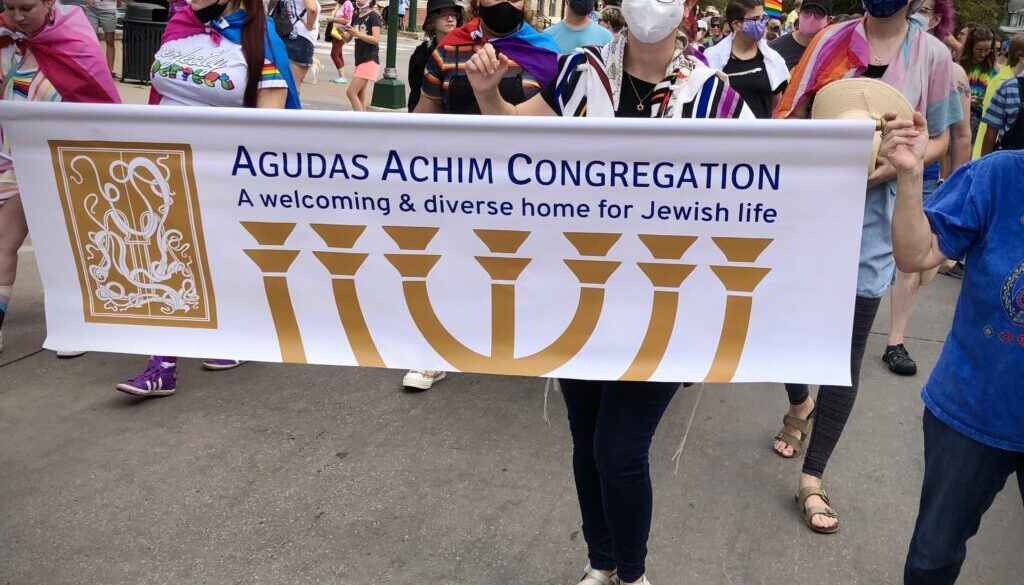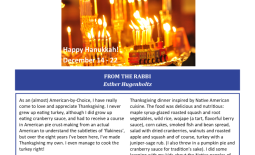Defying Dichotomies, Beyond Binaries
(Sermon in honor of Iowa City’s Pride Weekend)
Once upon a time, I was finishing college in Amsterdam and working a dead-end temp job which I hated. Already then I wasn’t exactly quiet about being both Jewish and religious. Before I knew it, my not-very-well-informed colleague remarked pejoratively: ‘oh, you’re Jewish, so you follow the Torah?’ She scrunched up her face in disgust. ‘The Torah is really homophobic.’
My coworker-turned-Bible scholar gave me no choice but to explain that those verses could be interpreted very differently. She didn’t seem convinced and no matter how much I argued that LGBTQ-inclusive Judaism exists, she remained firmly entrenched in her position that religion in general and Judaism specifically must be really homophobic.
In a sense, my co-worker wasn’t wrong. While I wouldn’t categorically label the entire Torah as broadly ‘homophobic’, there’s no denying that there are two infamous verses in Vayikra (Leviticus 18:22 and 20:13) which appear to prohibit same-sex male intercourse. Many a Biblical scholar has looked critically at these cryptic verses and tried interpret them and there appears to be consensus in critical Biblical scholarship that those verses do not mean what we colloquially assume they do. At the same time, there is no denying that even if scholarship sheds new light on these prohibitions, the harm has already been done. For thousands of years, all over the world, in all Abrahamic traditions, the Torah has been (and continues to be) weaponized against the LGBTQ community.
The charge that the ‘Torah is homophobic’ engages in one important fallacy: it assumes that the Torah is a static text and that our relationship to it is stagnant. Certainly back then, working the dull hours of the graveyard shift at the dead-end job all those years ago, I didn’t consider the Torah static or stagnant. To me, then as now, the Torah is a living, breathing, vibrantly pulsating text that is scribed onto the parchment of our souls and that cries out to us, ‘darsheni’, ‘interpret me.’ This is the unique relationship that a Jew can have with their Torah; we read and write Torah and Torah reads and writes us.
As we know, Torah is open to interpretation, imagination, deconstruction and reinvention. Over millennia, the Torah has opened her tent to those who were previously shut out: those not of Kohanic (Priestly) lineage, those who were not rabbis, not men, not patriarchal, not heteronormative, not able-bodied, not neurotypical, not cisgender, not white… these voices are invited into the tent and enrich the Torah, weaving new perspectives into warp and weft, enlarging the text and adding to the divine conversation. One of the most powerful and more recent contribution in the access of the marginalized, is that of the LGBTQ community and the project of ‘queering Torah.’ This means that we switch out the lenses of oppression for those of liberation; that we imagine a new chorus of voices singing off the pages. Stories are told and retold and gain new meaning and momentum and the Torah is redeemed to remain a living, breathing, vibrantly pulsating text inscribed into our souls.
The question is no longer whether certain passages or the Torah as a whole is homophobic or heteronormative; the question becomes how the LGBTQ experience—a reimagining of love, orientation, gender—teaches us to read the Torah in a new way; where we ‘queer’ the Torah and bring out new layers of complexity, richness and wisdom.
Such creative queering work is being done as we speak and two inspiring examples came to me recently. The first called ‘Toratah’ (‘Her Torah’) by an Israeli-American artist, Yael Karanek. Kanarek decided to engage in something deceptively simple but startlingly effective: she decided to rewrite the Torah (both in Hebrew and English) by reversing the gender of all characters, including God. The masculine characters became feminine and vice versa.
All of a sudden, we read a Torah where ‘Elohin’, Goddess creates the universe and constructs the first human woman in Her image and eleven chapters later, carves out a covenant with ‘Emrahama’ (the female ‘Avraham’) siring an eternal lineage of mothers and daughters of the Jewish people. I had the chance to read the Creation account and found it surprisingly moving and compelling. Of course, every person who uses God in thought, writing and speech struggles with God’s gender. We all know in the abstract that the God of our tradition is genderless but Hebrew (and many other vernacular languages) are very much gendered. I recall referring to God as ‘Him’ in a rabbinical school application and being taken to task by a feminist Bible scholar. At the time, I argued that the male pronoun was just a convention of language. I am grateful that I have been given the opportunity to evolve my thinking on this.
Yael Karanek’s intention is not just to overthrow the patriarchy by inverting it, but by integrating it. Her ‘Torah’ is meant to be read alongside our ‘standard’ text; like two halves slipping seamlessly into each other, achieving a perfect shleimut, wholeness. The artist explains that the full integration of the gender spectrum of these two halves of an androgynous Torah actually allows for LGBTQ ‘midrashim’ to naturally emerge. All of a sudden, there are options on the table—the banquet of liberation is served and it is delicious.
Another ‘Torah queering’ that is making inroads into contemporary Jewish thought is the notion that we don’t only flip the binary (using the female pronoun for the Deity) but transcend the binary altogether by using the third-person-singular-pronoun for the Divine: They.
When I first saw this, I felt a jarring sensation. As a monotheist, ‘They’ as God’s pronoun had the inevitable association with plurality, or God forbid, polytheism. But, having come to know non-binary, gender-nonconforming and transgender people personally and using the ‘they’ pronoun with them, primed me to be far more receptive to this theological-linguistic proposal. It clicked and all of a sudden it made sense. Mark Silk, a Professor of Religion in Public Life at Trinity College in ‘Religion News Service’ argues compellingly that They is more authentic to the complex grammatical and theological reality of ‘Elohim’ than the singular He (or, for that matter, She). Just as we know that Elohim still refers to a singular Deity, so too does the pronoun They, while containing within it the unspeakable infinitude of the unknowable Divine. There is a sacred dialectical dynamism to They that does God far more justice than the static and reductive He/She. The author writes:
‘…we have been faced liturgically as well as theologically with the imperative of gender-neutral language, which means being obliged to repeat the word “God” where a gendered pronoun would normally be used… “They,”… solves the problem. As in: ‘Praise God from whom all blessings flow…’
He further argues that monotheist Abrahamic theology has had to contend with ‘embedded grammatical pluralism’ from the moment the very first pages of B’reishit were scribed down. In other words: our holy Torah can take this. Our holy Torah is ready to be queered; our holy Torah is thirsting to be queered. In fact, Genesis 1:27, the famous passage of humanity’s creation rings much more true when translated as ‘male and female They created them’. The Biblical linguistic convention of ‘merism’ where two contrasting parts of the whole include the entire spectrum of the whole, makes more sense where a non-binary God includes the continuum rather than the essentialized binary of male and female.
It would be possible to argue that discussions about gender, language and Torah seem self-indulgent when there is very real oppression and suffering in the LGBTQ community; both overseas and here at home. Discourse on language is not intended to minimize that suffering but amplify it and raise both voice and consciousness to imagine and build the world that the LGBTQ community deserves. In fact, we can go a step further: this would be the kind of world (and the kind of Torah) that aids in the liberation of all people, not just the LGBTQ community. The sacred mission of queering Torah is to center the voices and experiences of the LGBTQ community, but the old adage also holds true: none of us are free until all of us are free. A new vista of experiencing our tradition, our texts, ourselves and our God has been richly opened up. The tent of Torah is widened; we are all gathered in to our own great blessing.
We are invited to reflect on what it means for us, in the bones and sinews of our Judaism, to defy dichotomies and reach beyond binaries. To conceive of God as also being She/They is so liberating. It seems fitting to close this sermon with Professor Silk’s suggested translation for a core text of our liturgy:
‘The Eternal is my strength and my song;
They have become my salvation.
They are my God, and I will praise Them.’
This is of course from Shirat haYam, the Song of the Sea (Exodus 15:2), one of the ultimate songs of freedom found in the Torah. Mi Chamocha ba’Elim Adonai – who is like You, among the divinities, Adonai? Our Torah is beautiful, expansive and beyond constraining. Our Torah affirms and is affirmed. Never has the idea of all of humanity being created ‘b’tzelem Elohim’ resonated so clearly; never so close to what may have been intended by God Themself.




